Global Business Environment Analysis: Strategic Challenges, Shell Plc
VerifiedAdded on 2023/01/13
|21
|6995
|69
Report
AI Summary
This report delves into the global business environment, examining the concept of globalization and its key drivers such as cost, market, and competition, analyzing their implications, benefits, and challenges, particularly for Royal Dutch Shell Plc (Shell). It explores the complexities of strategic challenges faced by global businesses, including tariff barriers, administrative policies, and cultural diversities, using Shell as a case study. The report further analyzes the influences of globalization on organizational aspects like governance, leadership, structure, culture, and functions, along with ethical and sustainable considerations. It also applies the McKinsey 7S model and Hofstede's cultural dimensions to Shell, evaluating decision-making processes and strategies for entering global markets, while also discussing barriers to globalization and recommendations to overcome them. The report concludes with a critical evaluation of strategies adopted in the global market.
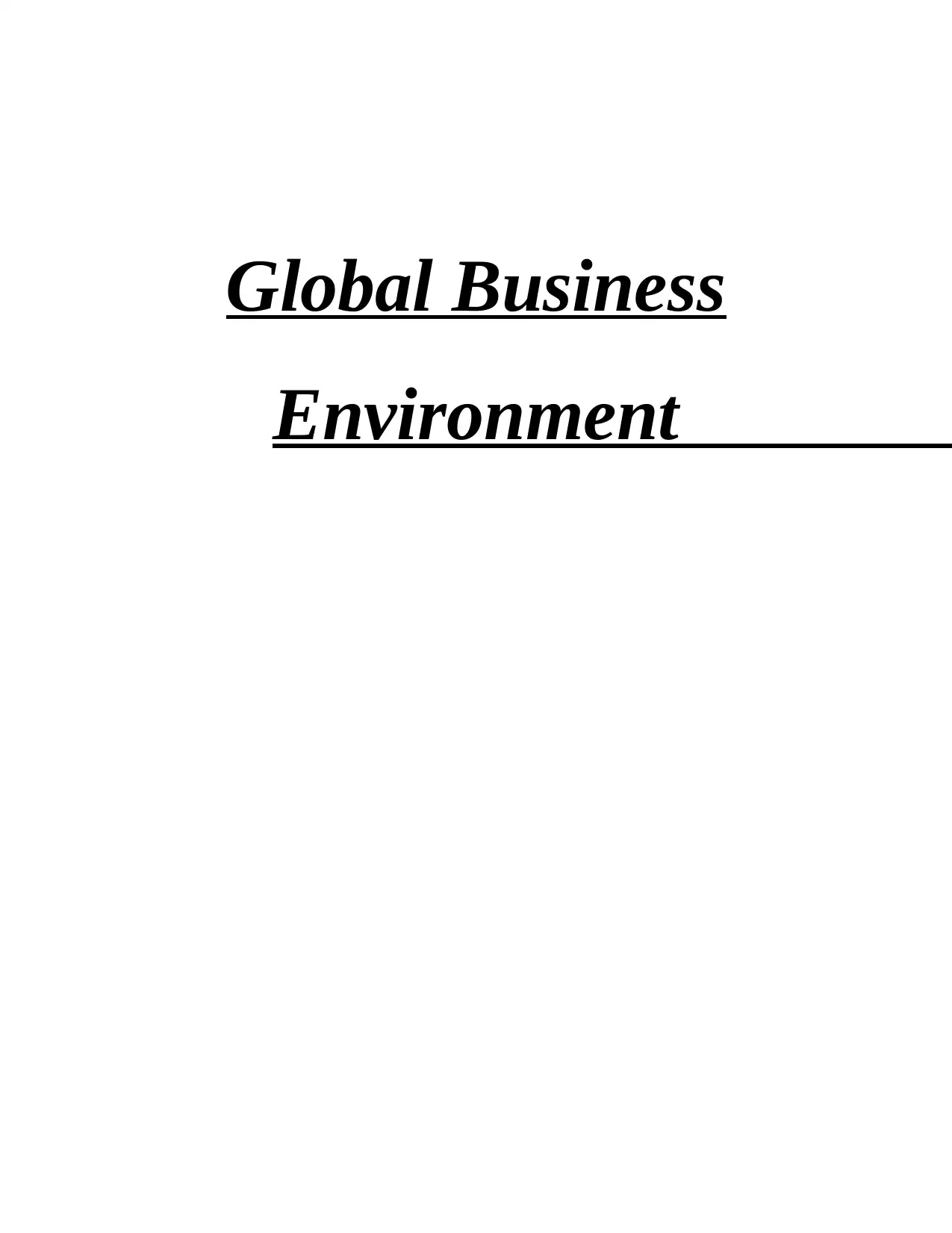
Global Business
Environment
Environment
Paraphrase This Document
Need a fresh take? Get an instant paraphrase of this document with our AI Paraphraser
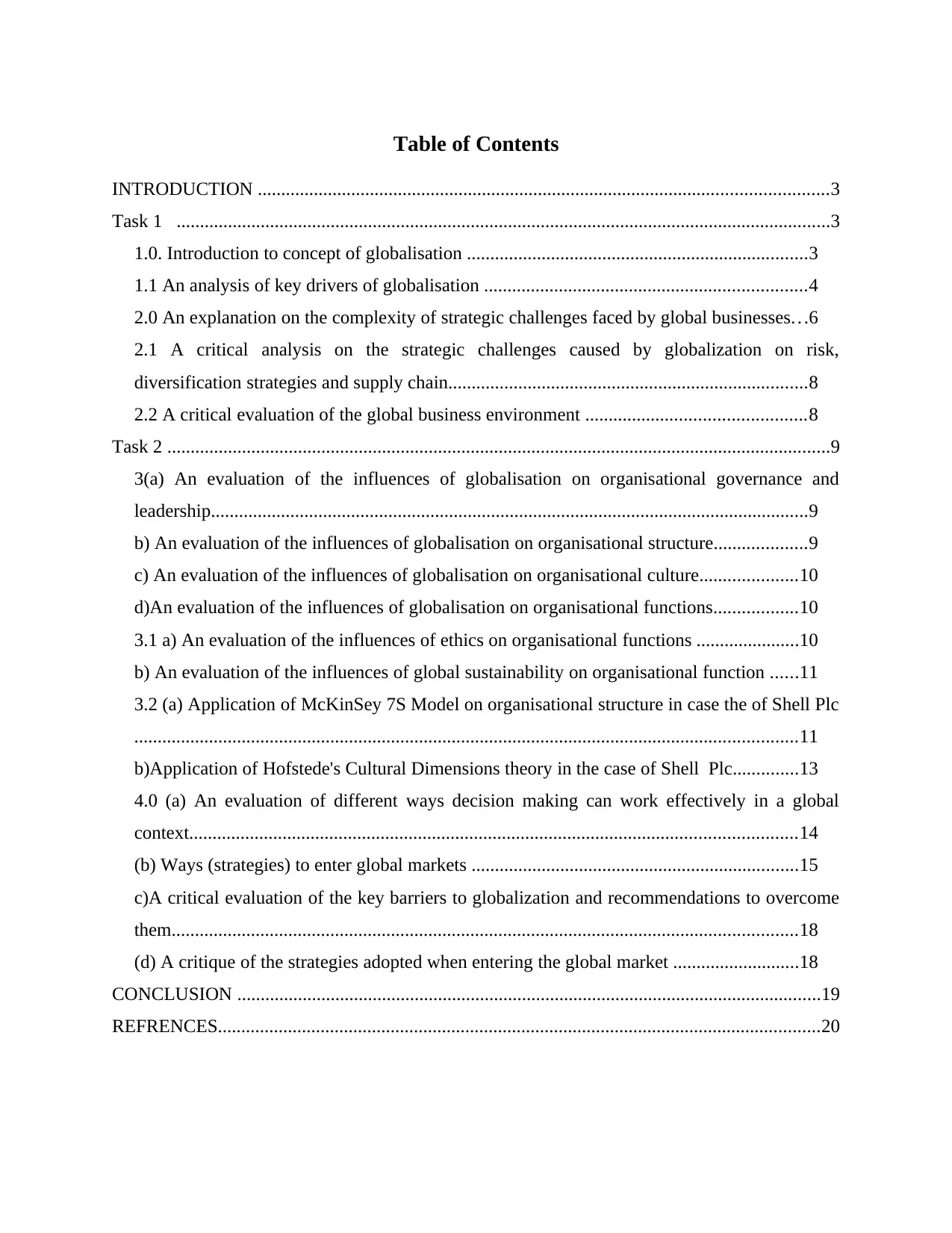
Table of Contents
INTRODUCTION ..........................................................................................................................3
Task 1 ............................................................................................................................................3
1.0. Introduction to concept of globalisation .........................................................................3
1.1 An analysis of key drivers of globalisation .....................................................................4
2.0 An explanation on the complexity of strategic challenges faced by global businesses.. .6
2.1 A critical analysis on the strategic challenges caused by globalization on risk,
diversification strategies and supply chain.............................................................................8
2.2 A critical evaluation of the global business environment ...............................................8
Task 2 ..............................................................................................................................................9
3(a) An evaluation of the influences of globalisation on organisational governance and
leadership................................................................................................................................9
b) An evaluation of the influences of globalisation on organisational structure....................9
c) An evaluation of the influences of globalisation on organisational culture.....................10
d)An evaluation of the influences of globalisation on organisational functions..................10
3.1 a) An evaluation of the influences of ethics on organisational functions ......................10
b) An evaluation of the influences of global sustainability on organisational function ......11
3.2 (a) Application of McKinSey 7S Model on organisational structure in case the of Shell Plc
..............................................................................................................................................11
b)Application of Hofstede's Cultural Dimensions theory in the case of Shell Plc..............13
4.0 (a) An evaluation of different ways decision making can work effectively in a global
context..................................................................................................................................14
(b) Ways (strategies) to enter global markets ......................................................................15
c)A critical evaluation of the key barriers to globalization and recommendations to overcome
them......................................................................................................................................18
(d) A critique of the strategies adopted when entering the global market ...........................18
CONCLUSION .............................................................................................................................19
REFRENCES.................................................................................................................................20
INTRODUCTION ..........................................................................................................................3
Task 1 ............................................................................................................................................3
1.0. Introduction to concept of globalisation .........................................................................3
1.1 An analysis of key drivers of globalisation .....................................................................4
2.0 An explanation on the complexity of strategic challenges faced by global businesses.. .6
2.1 A critical analysis on the strategic challenges caused by globalization on risk,
diversification strategies and supply chain.............................................................................8
2.2 A critical evaluation of the global business environment ...............................................8
Task 2 ..............................................................................................................................................9
3(a) An evaluation of the influences of globalisation on organisational governance and
leadership................................................................................................................................9
b) An evaluation of the influences of globalisation on organisational structure....................9
c) An evaluation of the influences of globalisation on organisational culture.....................10
d)An evaluation of the influences of globalisation on organisational functions..................10
3.1 a) An evaluation of the influences of ethics on organisational functions ......................10
b) An evaluation of the influences of global sustainability on organisational function ......11
3.2 (a) Application of McKinSey 7S Model on organisational structure in case the of Shell Plc
..............................................................................................................................................11
b)Application of Hofstede's Cultural Dimensions theory in the case of Shell Plc..............13
4.0 (a) An evaluation of different ways decision making can work effectively in a global
context..................................................................................................................................14
(b) Ways (strategies) to enter global markets ......................................................................15
c)A critical evaluation of the key barriers to globalization and recommendations to overcome
them......................................................................................................................................18
(d) A critique of the strategies adopted when entering the global market ...........................18
CONCLUSION .............................................................................................................................19
REFRENCES.................................................................................................................................20
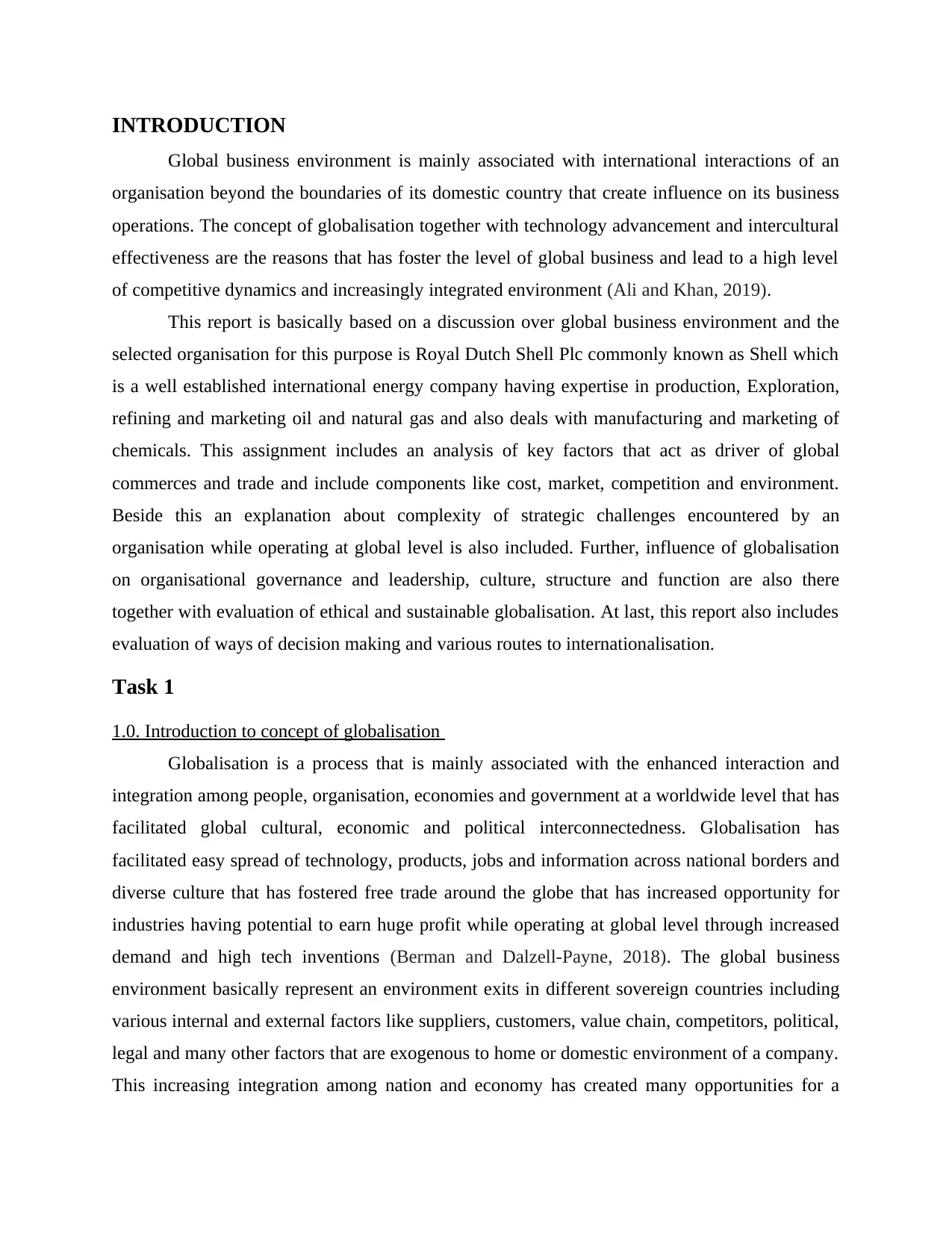
INTRODUCTION
Global business environment is mainly associated with international interactions of an
organisation beyond the boundaries of its domestic country that create influence on its business
operations. The concept of globalisation together with technology advancement and intercultural
effectiveness are the reasons that has foster the level of global business and lead to a high level
of competitive dynamics and increasingly integrated environment (Ali and Khan, 2019).
This report is basically based on a discussion over global business environment and the
selected organisation for this purpose is Royal Dutch Shell Plc commonly known as Shell which
is a well established international energy company having expertise in production, Exploration,
refining and marketing oil and natural gas and also deals with manufacturing and marketing of
chemicals. This assignment includes an analysis of key factors that act as driver of global
commerces and trade and include components like cost, market, competition and environment.
Beside this an explanation about complexity of strategic challenges encountered by an
organisation while operating at global level is also included. Further, influence of globalisation
on organisational governance and leadership, culture, structure and function are also there
together with evaluation of ethical and sustainable globalisation. At last, this report also includes
evaluation of ways of decision making and various routes to internationalisation.
Task 1
1.0. Introduction to concept of globalisation
Globalisation is a process that is mainly associated with the enhanced interaction and
integration among people, organisation, economies and government at a worldwide level that has
facilitated global cultural, economic and political interconnectedness. Globalisation has
facilitated easy spread of technology, products, jobs and information across national borders and
diverse culture that has fostered free trade around the globe that has increased opportunity for
industries having potential to earn huge profit while operating at global level through increased
demand and high tech inventions (Berman and Dalzell-Payne, 2018). The global business
environment basically represent an environment exits in different sovereign countries including
various internal and external factors like suppliers, customers, value chain, competitors, political,
legal and many other factors that are exogenous to home or domestic environment of a company.
This increasing integration among nation and economy has created many opportunities for a
Global business environment is mainly associated with international interactions of an
organisation beyond the boundaries of its domestic country that create influence on its business
operations. The concept of globalisation together with technology advancement and intercultural
effectiveness are the reasons that has foster the level of global business and lead to a high level
of competitive dynamics and increasingly integrated environment (Ali and Khan, 2019).
This report is basically based on a discussion over global business environment and the
selected organisation for this purpose is Royal Dutch Shell Plc commonly known as Shell which
is a well established international energy company having expertise in production, Exploration,
refining and marketing oil and natural gas and also deals with manufacturing and marketing of
chemicals. This assignment includes an analysis of key factors that act as driver of global
commerces and trade and include components like cost, market, competition and environment.
Beside this an explanation about complexity of strategic challenges encountered by an
organisation while operating at global level is also included. Further, influence of globalisation
on organisational governance and leadership, culture, structure and function are also there
together with evaluation of ethical and sustainable globalisation. At last, this report also includes
evaluation of ways of decision making and various routes to internationalisation.
Task 1
1.0. Introduction to concept of globalisation
Globalisation is a process that is mainly associated with the enhanced interaction and
integration among people, organisation, economies and government at a worldwide level that has
facilitated global cultural, economic and political interconnectedness. Globalisation has
facilitated easy spread of technology, products, jobs and information across national borders and
diverse culture that has fostered free trade around the globe that has increased opportunity for
industries having potential to earn huge profit while operating at global level through increased
demand and high tech inventions (Berman and Dalzell-Payne, 2018). The global business
environment basically represent an environment exits in different sovereign countries including
various internal and external factors like suppliers, customers, value chain, competitors, political,
legal and many other factors that are exogenous to home or domestic environment of a company.
This increasing integration among nation and economy has created many opportunities for a
⊘ This is a preview!⊘
Do you want full access?
Subscribe today to unlock all pages.

Trusted by 1+ million students worldwide
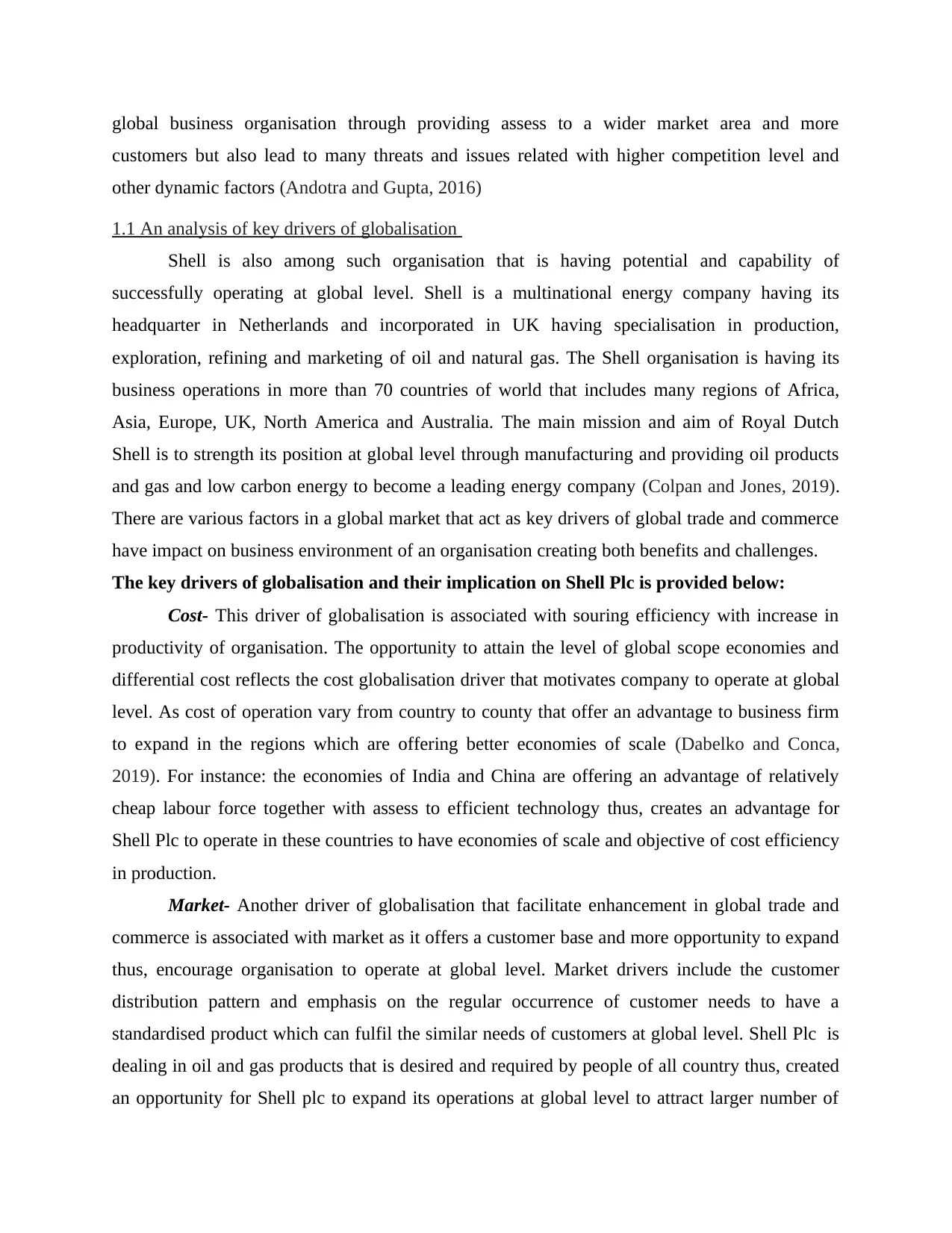
global business organisation through providing assess to a wider market area and more
customers but also lead to many threats and issues related with higher competition level and
other dynamic factors (Andotra and Gupta, 2016)
1.1 An analysis of key drivers of globalisation
Shell is also among such organisation that is having potential and capability of
successfully operating at global level. Shell is a multinational energy company having its
headquarter in Netherlands and incorporated in UK having specialisation in production,
exploration, refining and marketing of oil and natural gas. The Shell organisation is having its
business operations in more than 70 countries of world that includes many regions of Africa,
Asia, Europe, UK, North America and Australia. The main mission and aim of Royal Dutch
Shell is to strength its position at global level through manufacturing and providing oil products
and gas and low carbon energy to become a leading energy company (Colpan and Jones, 2019).
There are various factors in a global market that act as key drivers of global trade and commerce
have impact on business environment of an organisation creating both benefits and challenges.
The key drivers of globalisation and their implication on Shell Plc is provided below:
Cost- This driver of globalisation is associated with souring efficiency with increase in
productivity of organisation. The opportunity to attain the level of global scope economies and
differential cost reflects the cost globalisation driver that motivates company to operate at global
level. As cost of operation vary from country to county that offer an advantage to business firm
to expand in the regions which are offering better economies of scale (Dabelko and Conca,
2019). For instance: the economies of India and China are offering an advantage of relatively
cheap labour force together with assess to efficient technology thus, creates an advantage for
Shell Plc to operate in these countries to have economies of scale and objective of cost efficiency
in production.
Market- Another driver of globalisation that facilitate enhancement in global trade and
commerce is associated with market as it offers a customer base and more opportunity to expand
thus, encourage organisation to operate at global level. Market drivers include the customer
distribution pattern and emphasis on the regular occurrence of customer needs to have a
standardised product which can fulfil the similar needs of customers at global level. Shell Plc is
dealing in oil and gas products that is desired and required by people of all country thus, created
an opportunity for Shell plc to expand its operations at global level to attract larger number of
customers but also lead to many threats and issues related with higher competition level and
other dynamic factors (Andotra and Gupta, 2016)
1.1 An analysis of key drivers of globalisation
Shell is also among such organisation that is having potential and capability of
successfully operating at global level. Shell is a multinational energy company having its
headquarter in Netherlands and incorporated in UK having specialisation in production,
exploration, refining and marketing of oil and natural gas. The Shell organisation is having its
business operations in more than 70 countries of world that includes many regions of Africa,
Asia, Europe, UK, North America and Australia. The main mission and aim of Royal Dutch
Shell is to strength its position at global level through manufacturing and providing oil products
and gas and low carbon energy to become a leading energy company (Colpan and Jones, 2019).
There are various factors in a global market that act as key drivers of global trade and commerce
have impact on business environment of an organisation creating both benefits and challenges.
The key drivers of globalisation and their implication on Shell Plc is provided below:
Cost- This driver of globalisation is associated with souring efficiency with increase in
productivity of organisation. The opportunity to attain the level of global scope economies and
differential cost reflects the cost globalisation driver that motivates company to operate at global
level. As cost of operation vary from country to county that offer an advantage to business firm
to expand in the regions which are offering better economies of scale (Dabelko and Conca,
2019). For instance: the economies of India and China are offering an advantage of relatively
cheap labour force together with assess to efficient technology thus, creates an advantage for
Shell Plc to operate in these countries to have economies of scale and objective of cost efficiency
in production.
Market- Another driver of globalisation that facilitate enhancement in global trade and
commerce is associated with market as it offers a customer base and more opportunity to expand
thus, encourage organisation to operate at global level. Market drivers include the customer
distribution pattern and emphasis on the regular occurrence of customer needs to have a
standardised product which can fulfil the similar needs of customers at global level. Shell Plc is
dealing in oil and gas products that is desired and required by people of all country thus, created
an opportunity for Shell plc to expand its operations at global level to attract larger number of
Paraphrase This Document
Need a fresh take? Get an instant paraphrase of this document with our AI Paraphraser
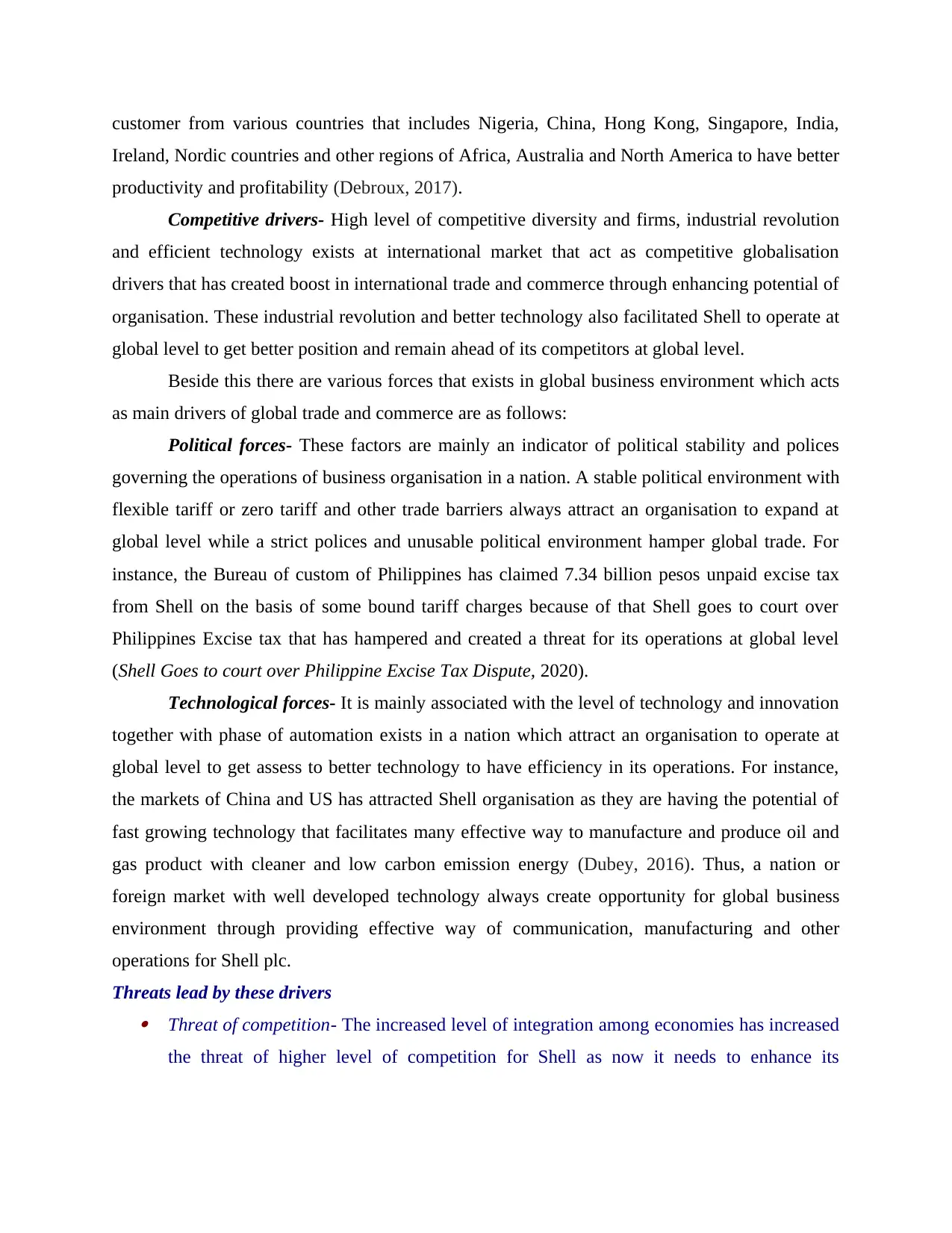
customer from various countries that includes Nigeria, China, Hong Kong, Singapore, India,
Ireland, Nordic countries and other regions of Africa, Australia and North America to have better
productivity and profitability (Debroux, 2017).
Competitive drivers- High level of competitive diversity and firms, industrial revolution
and efficient technology exists at international market that act as competitive globalisation
drivers that has created boost in international trade and commerce through enhancing potential of
organisation. These industrial revolution and better technology also facilitated Shell to operate at
global level to get better position and remain ahead of its competitors at global level.
Beside this there are various forces that exists in global business environment which acts
as main drivers of global trade and commerce are as follows:
Political forces- These factors are mainly an indicator of political stability and polices
governing the operations of business organisation in a nation. A stable political environment with
flexible tariff or zero tariff and other trade barriers always attract an organisation to expand at
global level while a strict polices and unusable political environment hamper global trade. For
instance, the Bureau of custom of Philippines has claimed 7.34 billion pesos unpaid excise tax
from Shell on the basis of some bound tariff charges because of that Shell goes to court over
Philippines Excise tax that has hampered and created a threat for its operations at global level
(Shell Goes to court over Philippine Excise Tax Dispute, 2020).
Technological forces- It is mainly associated with the level of technology and innovation
together with phase of automation exists in a nation which attract an organisation to operate at
global level to get assess to better technology to have efficiency in its operations. For instance,
the markets of China and US has attracted Shell organisation as they are having the potential of
fast growing technology that facilitates many effective way to manufacture and produce oil and
gas product with cleaner and low carbon emission energy (Dubey, 2016). Thus, a nation or
foreign market with well developed technology always create opportunity for global business
environment through providing effective way of communication, manufacturing and other
operations for Shell plc.
Threats lead by these drivers Threat of competition- The increased level of integration among economies has increased
the threat of higher level of competition for Shell as now it needs to enhance its
Ireland, Nordic countries and other regions of Africa, Australia and North America to have better
productivity and profitability (Debroux, 2017).
Competitive drivers- High level of competitive diversity and firms, industrial revolution
and efficient technology exists at international market that act as competitive globalisation
drivers that has created boost in international trade and commerce through enhancing potential of
organisation. These industrial revolution and better technology also facilitated Shell to operate at
global level to get better position and remain ahead of its competitors at global level.
Beside this there are various forces that exists in global business environment which acts
as main drivers of global trade and commerce are as follows:
Political forces- These factors are mainly an indicator of political stability and polices
governing the operations of business organisation in a nation. A stable political environment with
flexible tariff or zero tariff and other trade barriers always attract an organisation to expand at
global level while a strict polices and unusable political environment hamper global trade. For
instance, the Bureau of custom of Philippines has claimed 7.34 billion pesos unpaid excise tax
from Shell on the basis of some bound tariff charges because of that Shell goes to court over
Philippines Excise tax that has hampered and created a threat for its operations at global level
(Shell Goes to court over Philippine Excise Tax Dispute, 2020).
Technological forces- It is mainly associated with the level of technology and innovation
together with phase of automation exists in a nation which attract an organisation to operate at
global level to get assess to better technology to have efficiency in its operations. For instance,
the markets of China and US has attracted Shell organisation as they are having the potential of
fast growing technology that facilitates many effective way to manufacture and produce oil and
gas product with cleaner and low carbon emission energy (Dubey, 2016). Thus, a nation or
foreign market with well developed technology always create opportunity for global business
environment through providing effective way of communication, manufacturing and other
operations for Shell plc.
Threats lead by these drivers Threat of competition- The increased level of integration among economies has increased
the threat of higher level of competition for Shell as now it needs to enhance its
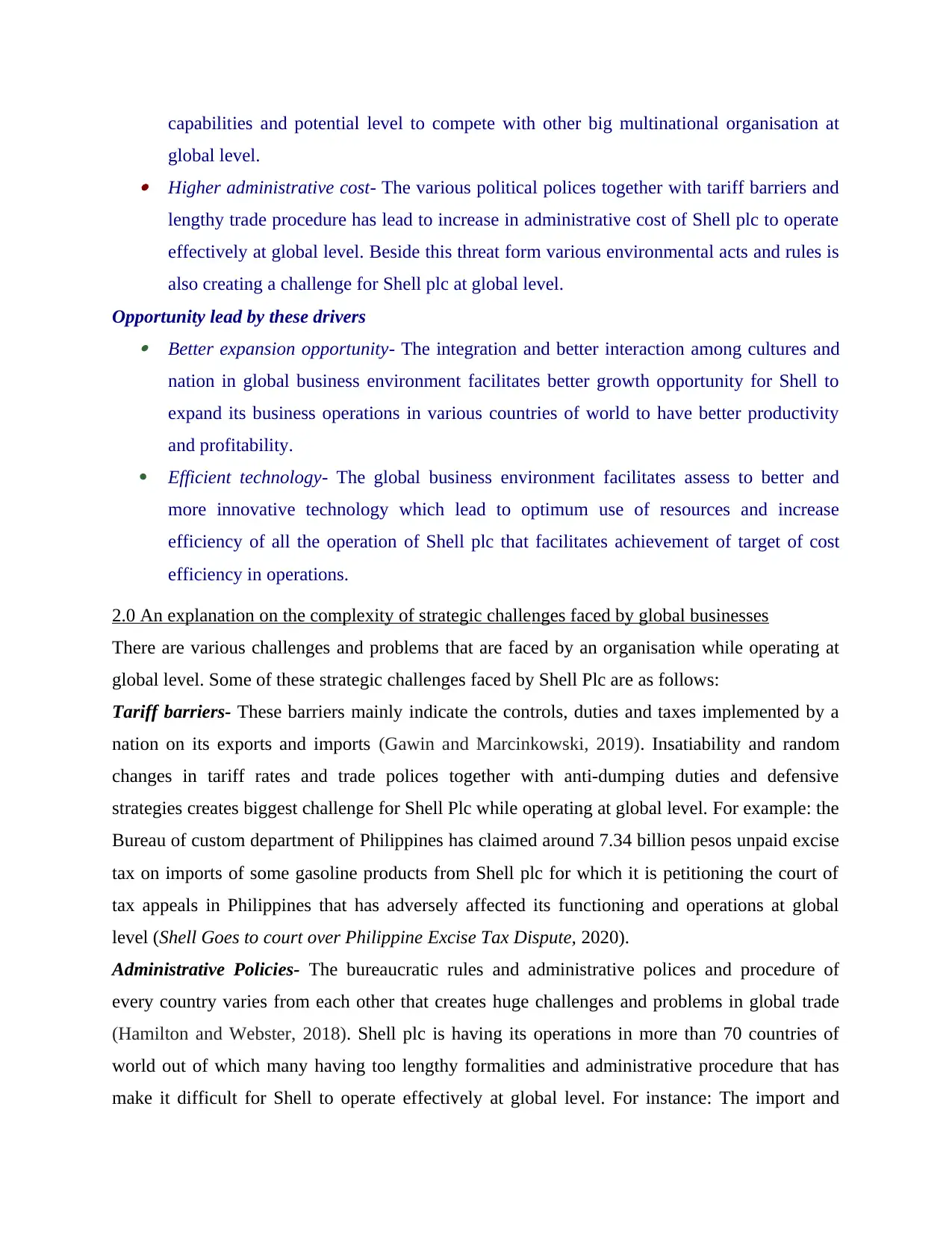
capabilities and potential level to compete with other big multinational organisation at
global level. Higher administrative cost- The various political polices together with tariff barriers and
lengthy trade procedure has lead to increase in administrative cost of Shell plc to operate
effectively at global level. Beside this threat form various environmental acts and rules is
also creating a challenge for Shell plc at global level.
Opportunity lead by these drivers Better expansion opportunity- The integration and better interaction among cultures and
nation in global business environment facilitates better growth opportunity for Shell to
expand its business operations in various countries of world to have better productivity
and profitability.
Efficient technology- The global business environment facilitates assess to better and
more innovative technology which lead to optimum use of resources and increase
efficiency of all the operation of Shell plc that facilitates achievement of target of cost
efficiency in operations.
2.0 An explanation on the complexity of strategic challenges faced by global businesses
There are various challenges and problems that are faced by an organisation while operating at
global level. Some of these strategic challenges faced by Shell Plc are as follows:
Tariff barriers- These barriers mainly indicate the controls, duties and taxes implemented by a
nation on its exports and imports (Gawin and Marcinkowski, 2019). Insatiability and random
changes in tariff rates and trade polices together with anti-dumping duties and defensive
strategies creates biggest challenge for Shell Plc while operating at global level. For example: the
Bureau of custom department of Philippines has claimed around 7.34 billion pesos unpaid excise
tax on imports of some gasoline products from Shell plc for which it is petitioning the court of
tax appeals in Philippines that has adversely affected its functioning and operations at global
level (Shell Goes to court over Philippine Excise Tax Dispute, 2020).
Administrative Policies- The bureaucratic rules and administrative polices and procedure of
every country varies from each other that creates huge challenges and problems in global trade
(Hamilton and Webster, 2018). Shell plc is having its operations in more than 70 countries of
world out of which many having too lengthy formalities and administrative procedure that has
make it difficult for Shell to operate effectively at global level. For instance: The import and
global level. Higher administrative cost- The various political polices together with tariff barriers and
lengthy trade procedure has lead to increase in administrative cost of Shell plc to operate
effectively at global level. Beside this threat form various environmental acts and rules is
also creating a challenge for Shell plc at global level.
Opportunity lead by these drivers Better expansion opportunity- The integration and better interaction among cultures and
nation in global business environment facilitates better growth opportunity for Shell to
expand its business operations in various countries of world to have better productivity
and profitability.
Efficient technology- The global business environment facilitates assess to better and
more innovative technology which lead to optimum use of resources and increase
efficiency of all the operation of Shell plc that facilitates achievement of target of cost
efficiency in operations.
2.0 An explanation on the complexity of strategic challenges faced by global businesses
There are various challenges and problems that are faced by an organisation while operating at
global level. Some of these strategic challenges faced by Shell Plc are as follows:
Tariff barriers- These barriers mainly indicate the controls, duties and taxes implemented by a
nation on its exports and imports (Gawin and Marcinkowski, 2019). Insatiability and random
changes in tariff rates and trade polices together with anti-dumping duties and defensive
strategies creates biggest challenge for Shell Plc while operating at global level. For example: the
Bureau of custom department of Philippines has claimed around 7.34 billion pesos unpaid excise
tax on imports of some gasoline products from Shell plc for which it is petitioning the court of
tax appeals in Philippines that has adversely affected its functioning and operations at global
level (Shell Goes to court over Philippine Excise Tax Dispute, 2020).
Administrative Policies- The bureaucratic rules and administrative polices and procedure of
every country varies from each other that creates huge challenges and problems in global trade
(Hamilton and Webster, 2018). Shell plc is having its operations in more than 70 countries of
world out of which many having too lengthy formalities and administrative procedure that has
make it difficult for Shell to operate effectively at global level. For instance: The import and
⊘ This is a preview!⊘
Do you want full access?
Subscribe today to unlock all pages.

Trusted by 1+ million students worldwide
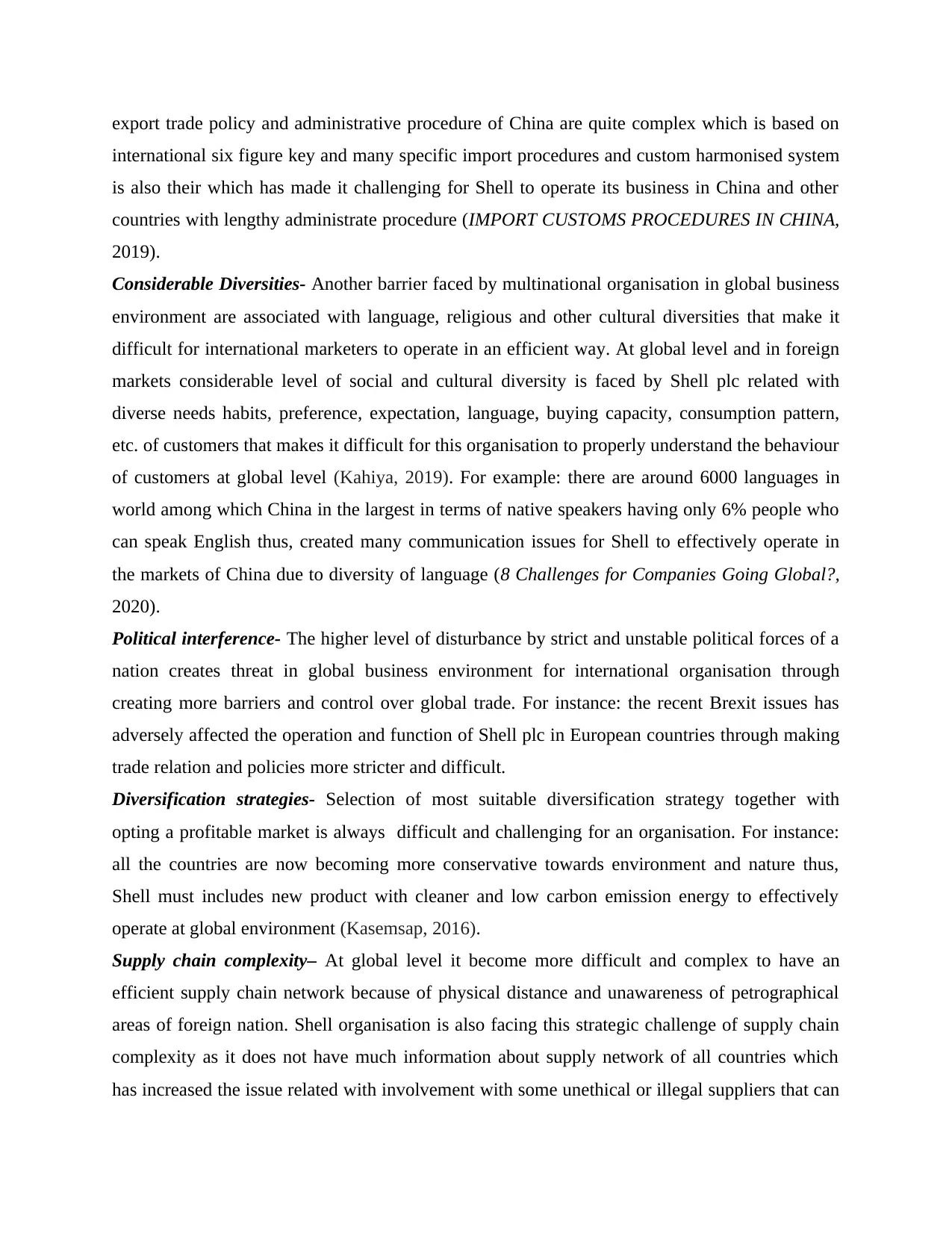
export trade policy and administrative procedure of China are quite complex which is based on
international six figure key and many specific import procedures and custom harmonised system
is also their which has made it challenging for Shell to operate its business in China and other
countries with lengthy administrate procedure (IMPORT CUSTOMS PROCEDURES IN CHINA,
2019).
Considerable Diversities- Another barrier faced by multinational organisation in global business
environment are associated with language, religious and other cultural diversities that make it
difficult for international marketers to operate in an efficient way. At global level and in foreign
markets considerable level of social and cultural diversity is faced by Shell plc related with
diverse needs habits, preference, expectation, language, buying capacity, consumption pattern,
etc. of customers that makes it difficult for this organisation to properly understand the behaviour
of customers at global level (Kahiya, 2019). For example: there are around 6000 languages in
world among which China in the largest in terms of native speakers having only 6% people who
can speak English thus, created many communication issues for Shell to effectively operate in
the markets of China due to diversity of language (8 Challenges for Companies Going Global?,
2020).
Political interference- The higher level of disturbance by strict and unstable political forces of a
nation creates threat in global business environment for international organisation through
creating more barriers and control over global trade. For instance: the recent Brexit issues has
adversely affected the operation and function of Shell plc in European countries through making
trade relation and policies more stricter and difficult.
Diversification strategies- Selection of most suitable diversification strategy together with
opting a profitable market is always difficult and challenging for an organisation. For instance:
all the countries are now becoming more conservative towards environment and nature thus,
Shell must includes new product with cleaner and low carbon emission energy to effectively
operate at global environment (Kasemsap, 2016).
Supply chain complexity– At global level it become more difficult and complex to have an
efficient supply chain network because of physical distance and unawareness of petrographical
areas of foreign nation. Shell organisation is also facing this strategic challenge of supply chain
complexity as it does not have much information about supply network of all countries which
has increased the issue related with involvement with some unethical or illegal suppliers that can
international six figure key and many specific import procedures and custom harmonised system
is also their which has made it challenging for Shell to operate its business in China and other
countries with lengthy administrate procedure (IMPORT CUSTOMS PROCEDURES IN CHINA,
2019).
Considerable Diversities- Another barrier faced by multinational organisation in global business
environment are associated with language, religious and other cultural diversities that make it
difficult for international marketers to operate in an efficient way. At global level and in foreign
markets considerable level of social and cultural diversity is faced by Shell plc related with
diverse needs habits, preference, expectation, language, buying capacity, consumption pattern,
etc. of customers that makes it difficult for this organisation to properly understand the behaviour
of customers at global level (Kahiya, 2019). For example: there are around 6000 languages in
world among which China in the largest in terms of native speakers having only 6% people who
can speak English thus, created many communication issues for Shell to effectively operate in
the markets of China due to diversity of language (8 Challenges for Companies Going Global?,
2020).
Political interference- The higher level of disturbance by strict and unstable political forces of a
nation creates threat in global business environment for international organisation through
creating more barriers and control over global trade. For instance: the recent Brexit issues has
adversely affected the operation and function of Shell plc in European countries through making
trade relation and policies more stricter and difficult.
Diversification strategies- Selection of most suitable diversification strategy together with
opting a profitable market is always difficult and challenging for an organisation. For instance:
all the countries are now becoming more conservative towards environment and nature thus,
Shell must includes new product with cleaner and low carbon emission energy to effectively
operate at global environment (Kasemsap, 2016).
Supply chain complexity– At global level it become more difficult and complex to have an
efficient supply chain network because of physical distance and unawareness of petrographical
areas of foreign nation. Shell organisation is also facing this strategic challenge of supply chain
complexity as it does not have much information about supply network of all countries which
has increased the issue related with involvement with some unethical or illegal suppliers that can
Paraphrase This Document
Need a fresh take? Get an instant paraphrase of this document with our AI Paraphraser
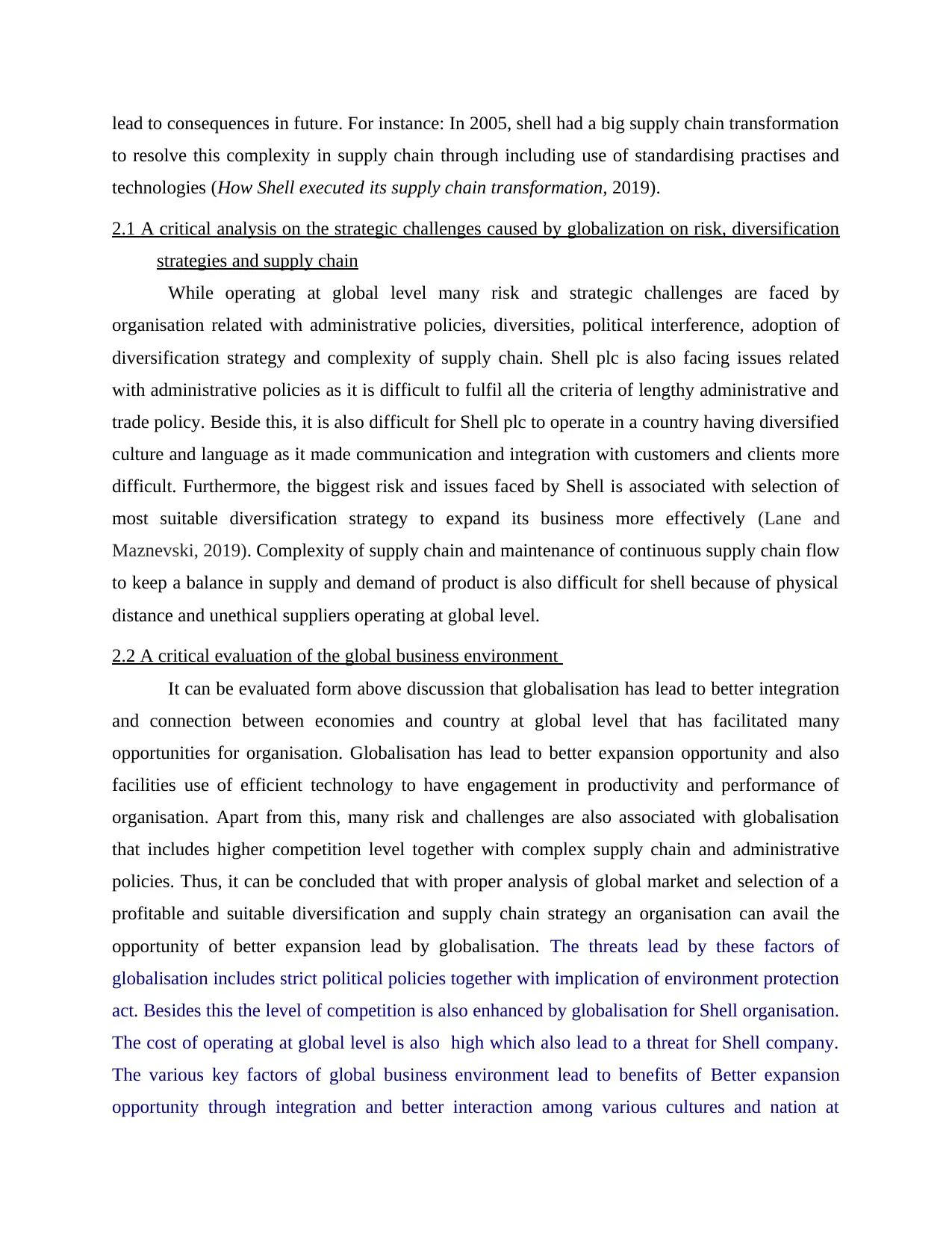
lead to consequences in future. For instance: In 2005, shell had a big supply chain transformation
to resolve this complexity in supply chain through including use of standardising practises and
technologies (How Shell executed its supply chain transformation, 2019).
2.1 A critical analysis on the strategic challenges caused by globalization on risk, diversification
strategies and supply chain
While operating at global level many risk and strategic challenges are faced by
organisation related with administrative policies, diversities, political interference, adoption of
diversification strategy and complexity of supply chain. Shell plc is also facing issues related
with administrative policies as it is difficult to fulfil all the criteria of lengthy administrative and
trade policy. Beside this, it is also difficult for Shell plc to operate in a country having diversified
culture and language as it made communication and integration with customers and clients more
difficult. Furthermore, the biggest risk and issues faced by Shell is associated with selection of
most suitable diversification strategy to expand its business more effectively (Lane and
Maznevski, 2019). Complexity of supply chain and maintenance of continuous supply chain flow
to keep a balance in supply and demand of product is also difficult for shell because of physical
distance and unethical suppliers operating at global level.
2.2 A critical evaluation of the global business environment
It can be evaluated form above discussion that globalisation has lead to better integration
and connection between economies and country at global level that has facilitated many
opportunities for organisation. Globalisation has lead to better expansion opportunity and also
facilities use of efficient technology to have engagement in productivity and performance of
organisation. Apart from this, many risk and challenges are also associated with globalisation
that includes higher competition level together with complex supply chain and administrative
policies. Thus, it can be concluded that with proper analysis of global market and selection of a
profitable and suitable diversification and supply chain strategy an organisation can avail the
opportunity of better expansion lead by globalisation. The threats lead by these factors of
globalisation includes strict political policies together with implication of environment protection
act. Besides this the level of competition is also enhanced by globalisation for Shell organisation.
The cost of operating at global level is also high which also lead to a threat for Shell company.
The various key factors of global business environment lead to benefits of Better expansion
opportunity through integration and better interaction among various cultures and nation at
to resolve this complexity in supply chain through including use of standardising practises and
technologies (How Shell executed its supply chain transformation, 2019).
2.1 A critical analysis on the strategic challenges caused by globalization on risk, diversification
strategies and supply chain
While operating at global level many risk and strategic challenges are faced by
organisation related with administrative policies, diversities, political interference, adoption of
diversification strategy and complexity of supply chain. Shell plc is also facing issues related
with administrative policies as it is difficult to fulfil all the criteria of lengthy administrative and
trade policy. Beside this, it is also difficult for Shell plc to operate in a country having diversified
culture and language as it made communication and integration with customers and clients more
difficult. Furthermore, the biggest risk and issues faced by Shell is associated with selection of
most suitable diversification strategy to expand its business more effectively (Lane and
Maznevski, 2019). Complexity of supply chain and maintenance of continuous supply chain flow
to keep a balance in supply and demand of product is also difficult for shell because of physical
distance and unethical suppliers operating at global level.
2.2 A critical evaluation of the global business environment
It can be evaluated form above discussion that globalisation has lead to better integration
and connection between economies and country at global level that has facilitated many
opportunities for organisation. Globalisation has lead to better expansion opportunity and also
facilities use of efficient technology to have engagement in productivity and performance of
organisation. Apart from this, many risk and challenges are also associated with globalisation
that includes higher competition level together with complex supply chain and administrative
policies. Thus, it can be concluded that with proper analysis of global market and selection of a
profitable and suitable diversification and supply chain strategy an organisation can avail the
opportunity of better expansion lead by globalisation. The threats lead by these factors of
globalisation includes strict political policies together with implication of environment protection
act. Besides this the level of competition is also enhanced by globalisation for Shell organisation.
The cost of operating at global level is also high which also lead to a threat for Shell company.
The various key factors of global business environment lead to benefits of Better expansion
opportunity through integration and better interaction among various cultures and nation at
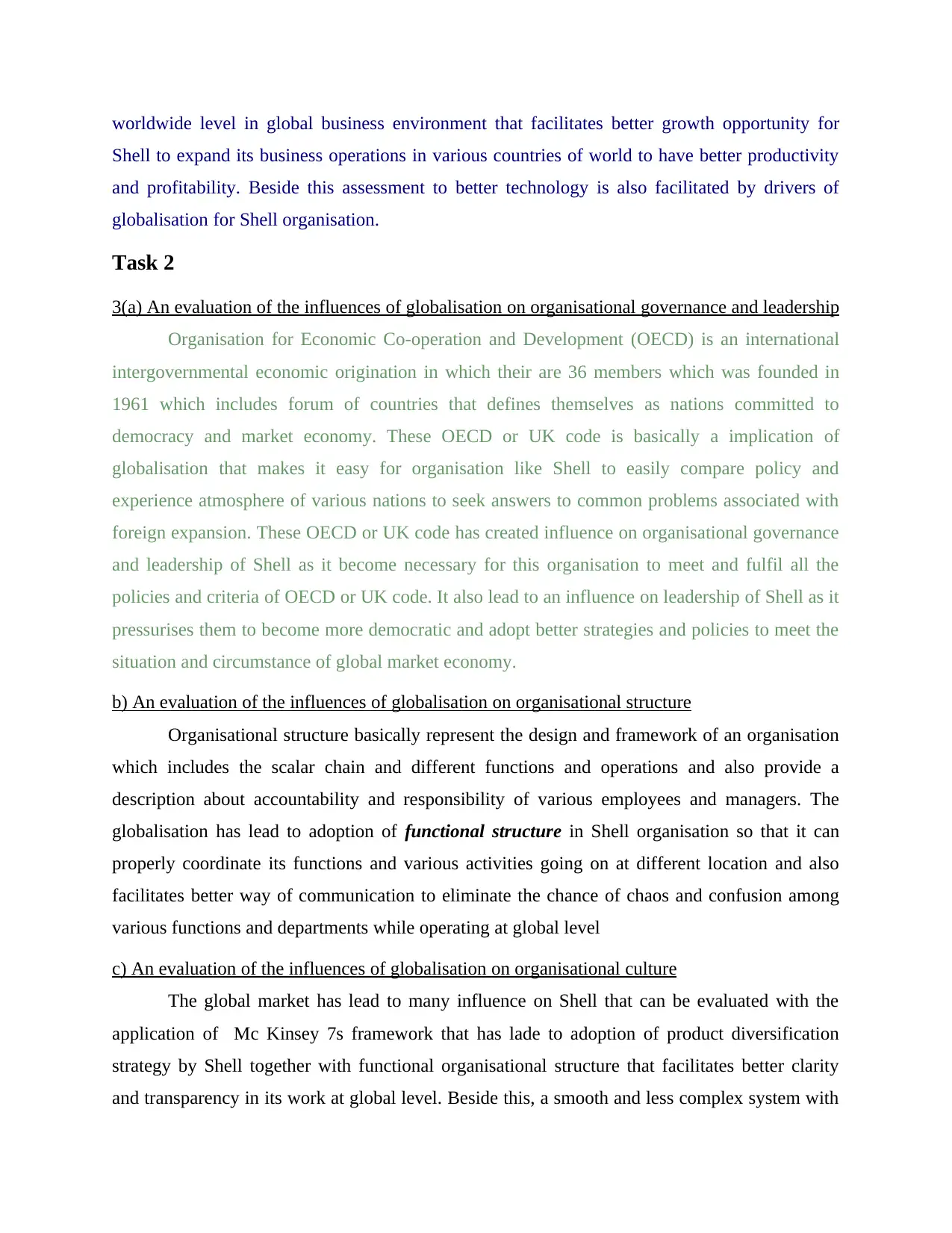
worldwide level in global business environment that facilitates better growth opportunity for
Shell to expand its business operations in various countries of world to have better productivity
and profitability. Beside this assessment to better technology is also facilitated by drivers of
globalisation for Shell organisation.
Task 2
3(a) An evaluation of the influences of globalisation on organisational governance and leadership
Organisation for Economic Co-operation and Development (OECD) is an international
intergovernmental economic origination in which their are 36 members which was founded in
1961 which includes forum of countries that defines themselves as nations committed to
democracy and market economy. These OECD or UK code is basically a implication of
globalisation that makes it easy for organisation like Shell to easily compare policy and
experience atmosphere of various nations to seek answers to common problems associated with
foreign expansion. These OECD or UK code has created influence on organisational governance
and leadership of Shell as it become necessary for this organisation to meet and fulfil all the
policies and criteria of OECD or UK code. It also lead to an influence on leadership of Shell as it
pressurises them to become more democratic and adopt better strategies and policies to meet the
situation and circumstance of global market economy.
b) An evaluation of the influences of globalisation on organisational structure
Organisational structure basically represent the design and framework of an organisation
which includes the scalar chain and different functions and operations and also provide a
description about accountability and responsibility of various employees and managers. The
globalisation has lead to adoption of functional structure in Shell organisation so that it can
properly coordinate its functions and various activities going on at different location and also
facilitates better way of communication to eliminate the chance of chaos and confusion among
various functions and departments while operating at global level
c) An evaluation of the influences of globalisation on organisational culture
The global market has lead to many influence on Shell that can be evaluated with the
application of Mc Kinsey 7s framework that has lade to adoption of product diversification
strategy by Shell together with functional organisational structure that facilitates better clarity
and transparency in its work at global level. Beside this, a smooth and less complex system with
Shell to expand its business operations in various countries of world to have better productivity
and profitability. Beside this assessment to better technology is also facilitated by drivers of
globalisation for Shell organisation.
Task 2
3(a) An evaluation of the influences of globalisation on organisational governance and leadership
Organisation for Economic Co-operation and Development (OECD) is an international
intergovernmental economic origination in which their are 36 members which was founded in
1961 which includes forum of countries that defines themselves as nations committed to
democracy and market economy. These OECD or UK code is basically a implication of
globalisation that makes it easy for organisation like Shell to easily compare policy and
experience atmosphere of various nations to seek answers to common problems associated with
foreign expansion. These OECD or UK code has created influence on organisational governance
and leadership of Shell as it become necessary for this organisation to meet and fulfil all the
policies and criteria of OECD or UK code. It also lead to an influence on leadership of Shell as it
pressurises them to become more democratic and adopt better strategies and policies to meet the
situation and circumstance of global market economy.
b) An evaluation of the influences of globalisation on organisational structure
Organisational structure basically represent the design and framework of an organisation
which includes the scalar chain and different functions and operations and also provide a
description about accountability and responsibility of various employees and managers. The
globalisation has lead to adoption of functional structure in Shell organisation so that it can
properly coordinate its functions and various activities going on at different location and also
facilitates better way of communication to eliminate the chance of chaos and confusion among
various functions and departments while operating at global level
c) An evaluation of the influences of globalisation on organisational culture
The global market has lead to many influence on Shell that can be evaluated with the
application of Mc Kinsey 7s framework that has lade to adoption of product diversification
strategy by Shell together with functional organisational structure that facilitates better clarity
and transparency in its work at global level. Beside this, a smooth and less complex system with
⊘ This is a preview!⊘
Do you want full access?
Subscribe today to unlock all pages.

Trusted by 1+ million students worldwide
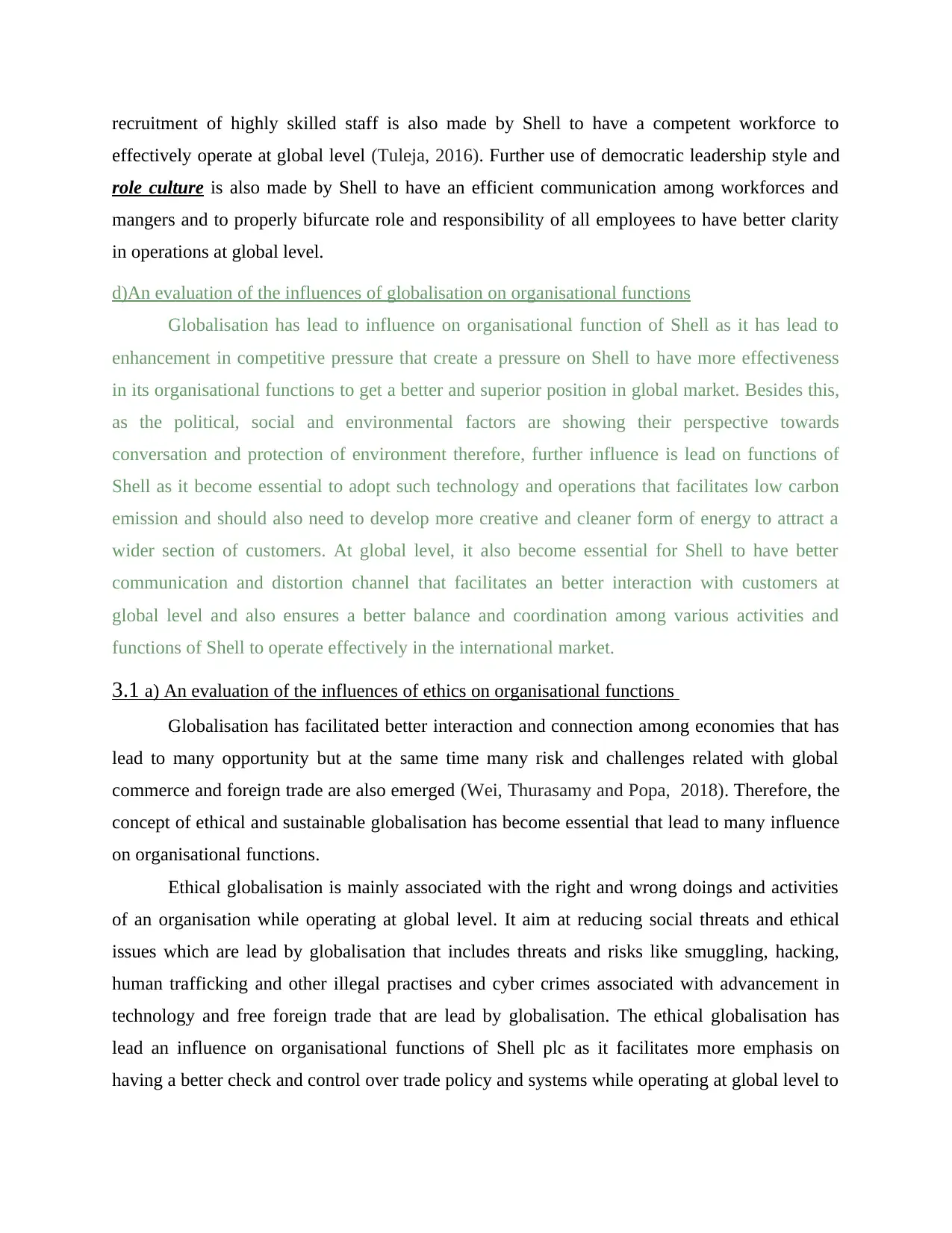
recruitment of highly skilled staff is also made by Shell to have a competent workforce to
effectively operate at global level (Tuleja, 2016). Further use of democratic leadership style and
role culture is also made by Shell to have an efficient communication among workforces and
mangers and to properly bifurcate role and responsibility of all employees to have better clarity
in operations at global level.
d)An evaluation of the influences of globalisation on organisational functions
Globalisation has lead to influence on organisational function of Shell as it has lead to
enhancement in competitive pressure that create a pressure on Shell to have more effectiveness
in its organisational functions to get a better and superior position in global market. Besides this,
as the political, social and environmental factors are showing their perspective towards
conversation and protection of environment therefore, further influence is lead on functions of
Shell as it become essential to adopt such technology and operations that facilitates low carbon
emission and should also need to develop more creative and cleaner form of energy to attract a
wider section of customers. At global level, it also become essential for Shell to have better
communication and distortion channel that facilitates an better interaction with customers at
global level and also ensures a better balance and coordination among various activities and
functions of Shell to operate effectively in the international market.
3.1 a) An evaluation of the influences of ethics on organisational functions
Globalisation has facilitated better interaction and connection among economies that has
lead to many opportunity but at the same time many risk and challenges related with global
commerce and foreign trade are also emerged (Wei, Thurasamy and Popa, 2018). Therefore, the
concept of ethical and sustainable globalisation has become essential that lead to many influence
on organisational functions.
Ethical globalisation is mainly associated with the right and wrong doings and activities
of an organisation while operating at global level. It aim at reducing social threats and ethical
issues which are lead by globalisation that includes threats and risks like smuggling, hacking,
human trafficking and other illegal practises and cyber crimes associated with advancement in
technology and free foreign trade that are lead by globalisation. The ethical globalisation has
lead an influence on organisational functions of Shell plc as it facilitates more emphasis on
having a better check and control over trade policy and systems while operating at global level to
effectively operate at global level (Tuleja, 2016). Further use of democratic leadership style and
role culture is also made by Shell to have an efficient communication among workforces and
mangers and to properly bifurcate role and responsibility of all employees to have better clarity
in operations at global level.
d)An evaluation of the influences of globalisation on organisational functions
Globalisation has lead to influence on organisational function of Shell as it has lead to
enhancement in competitive pressure that create a pressure on Shell to have more effectiveness
in its organisational functions to get a better and superior position in global market. Besides this,
as the political, social and environmental factors are showing their perspective towards
conversation and protection of environment therefore, further influence is lead on functions of
Shell as it become essential to adopt such technology and operations that facilitates low carbon
emission and should also need to develop more creative and cleaner form of energy to attract a
wider section of customers. At global level, it also become essential for Shell to have better
communication and distortion channel that facilitates an better interaction with customers at
global level and also ensures a better balance and coordination among various activities and
functions of Shell to operate effectively in the international market.
3.1 a) An evaluation of the influences of ethics on organisational functions
Globalisation has facilitated better interaction and connection among economies that has
lead to many opportunity but at the same time many risk and challenges related with global
commerce and foreign trade are also emerged (Wei, Thurasamy and Popa, 2018). Therefore, the
concept of ethical and sustainable globalisation has become essential that lead to many influence
on organisational functions.
Ethical globalisation is mainly associated with the right and wrong doings and activities
of an organisation while operating at global level. It aim at reducing social threats and ethical
issues which are lead by globalisation that includes threats and risks like smuggling, hacking,
human trafficking and other illegal practises and cyber crimes associated with advancement in
technology and free foreign trade that are lead by globalisation. The ethical globalisation has
lead an influence on organisational functions of Shell plc as it facilitates more emphasis on
having a better check and control over trade policy and systems while operating at global level to
Paraphrase This Document
Need a fresh take? Get an instant paraphrase of this document with our AI Paraphraser
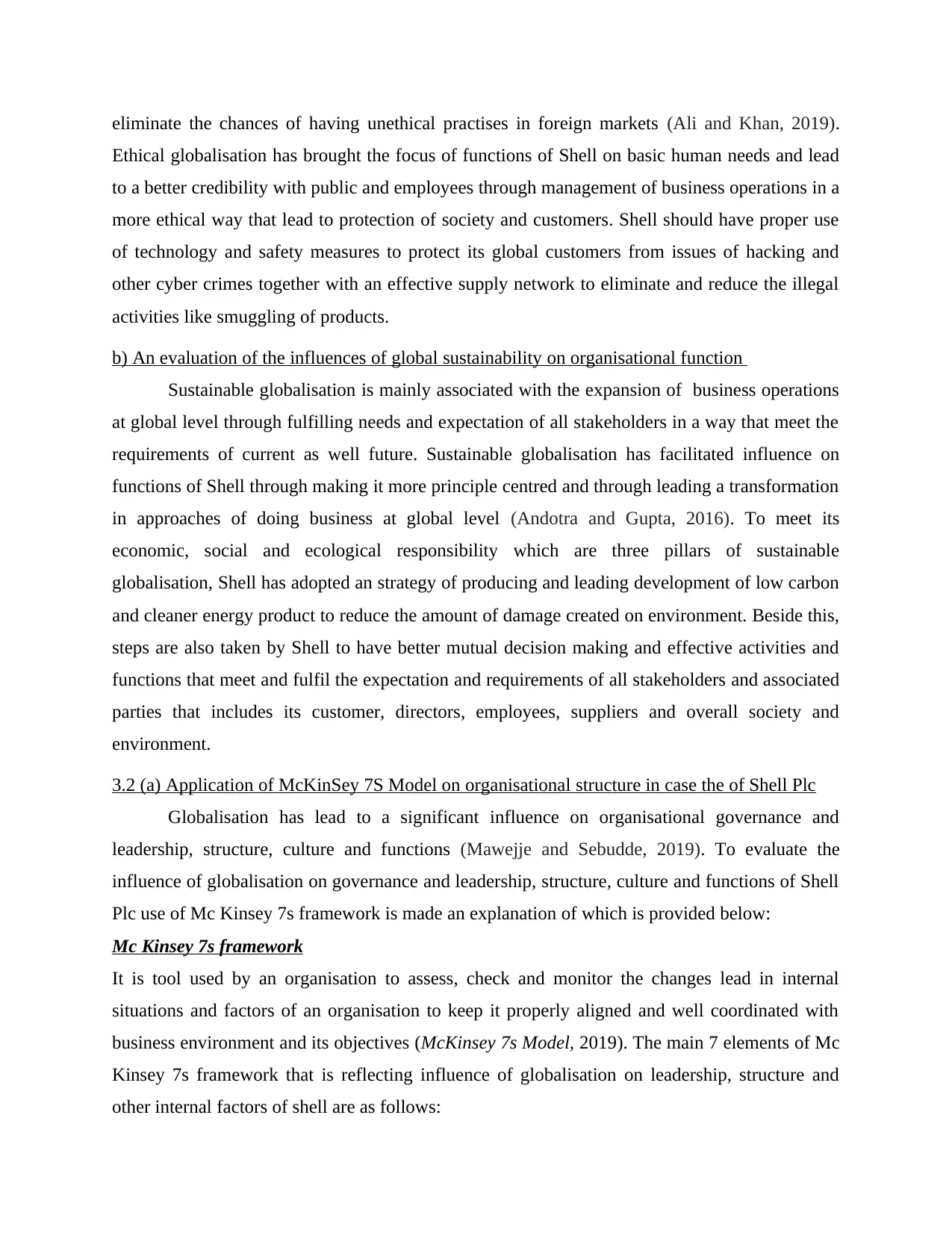
eliminate the chances of having unethical practises in foreign markets (Ali and Khan, 2019).
Ethical globalisation has brought the focus of functions of Shell on basic human needs and lead
to a better credibility with public and employees through management of business operations in a
more ethical way that lead to protection of society and customers. Shell should have proper use
of technology and safety measures to protect its global customers from issues of hacking and
other cyber crimes together with an effective supply network to eliminate and reduce the illegal
activities like smuggling of products.
b) An evaluation of the influences of global sustainability on organisational function
Sustainable globalisation is mainly associated with the expansion of business operations
at global level through fulfilling needs and expectation of all stakeholders in a way that meet the
requirements of current as well future. Sustainable globalisation has facilitated influence on
functions of Shell through making it more principle centred and through leading a transformation
in approaches of doing business at global level (Andotra and Gupta, 2016). To meet its
economic, social and ecological responsibility which are three pillars of sustainable
globalisation, Shell has adopted an strategy of producing and leading development of low carbon
and cleaner energy product to reduce the amount of damage created on environment. Beside this,
steps are also taken by Shell to have better mutual decision making and effective activities and
functions that meet and fulfil the expectation and requirements of all stakeholders and associated
parties that includes its customer, directors, employees, suppliers and overall society and
environment.
3.2 (a) Application of McKinSey 7S Model on organisational structure in case the of Shell Plc
Globalisation has lead to a significant influence on organisational governance and
leadership, structure, culture and functions (Mawejje and Sebudde, 2019). To evaluate the
influence of globalisation on governance and leadership, structure, culture and functions of Shell
Plc use of Mc Kinsey 7s framework is made an explanation of which is provided below:
Mc Kinsey 7s framework
It is tool used by an organisation to assess, check and monitor the changes lead in internal
situations and factors of an organisation to keep it properly aligned and well coordinated with
business environment and its objectives (McKinsey 7s Model, 2019). The main 7 elements of Mc
Kinsey 7s framework that is reflecting influence of globalisation on leadership, structure and
other internal factors of shell are as follows:
Ethical globalisation has brought the focus of functions of Shell on basic human needs and lead
to a better credibility with public and employees through management of business operations in a
more ethical way that lead to protection of society and customers. Shell should have proper use
of technology and safety measures to protect its global customers from issues of hacking and
other cyber crimes together with an effective supply network to eliminate and reduce the illegal
activities like smuggling of products.
b) An evaluation of the influences of global sustainability on organisational function
Sustainable globalisation is mainly associated with the expansion of business operations
at global level through fulfilling needs and expectation of all stakeholders in a way that meet the
requirements of current as well future. Sustainable globalisation has facilitated influence on
functions of Shell through making it more principle centred and through leading a transformation
in approaches of doing business at global level (Andotra and Gupta, 2016). To meet its
economic, social and ecological responsibility which are three pillars of sustainable
globalisation, Shell has adopted an strategy of producing and leading development of low carbon
and cleaner energy product to reduce the amount of damage created on environment. Beside this,
steps are also taken by Shell to have better mutual decision making and effective activities and
functions that meet and fulfil the expectation and requirements of all stakeholders and associated
parties that includes its customer, directors, employees, suppliers and overall society and
environment.
3.2 (a) Application of McKinSey 7S Model on organisational structure in case the of Shell Plc
Globalisation has lead to a significant influence on organisational governance and
leadership, structure, culture and functions (Mawejje and Sebudde, 2019). To evaluate the
influence of globalisation on governance and leadership, structure, culture and functions of Shell
Plc use of Mc Kinsey 7s framework is made an explanation of which is provided below:
Mc Kinsey 7s framework
It is tool used by an organisation to assess, check and monitor the changes lead in internal
situations and factors of an organisation to keep it properly aligned and well coordinated with
business environment and its objectives (McKinsey 7s Model, 2019). The main 7 elements of Mc
Kinsey 7s framework that is reflecting influence of globalisation on leadership, structure and
other internal factors of shell are as follows:
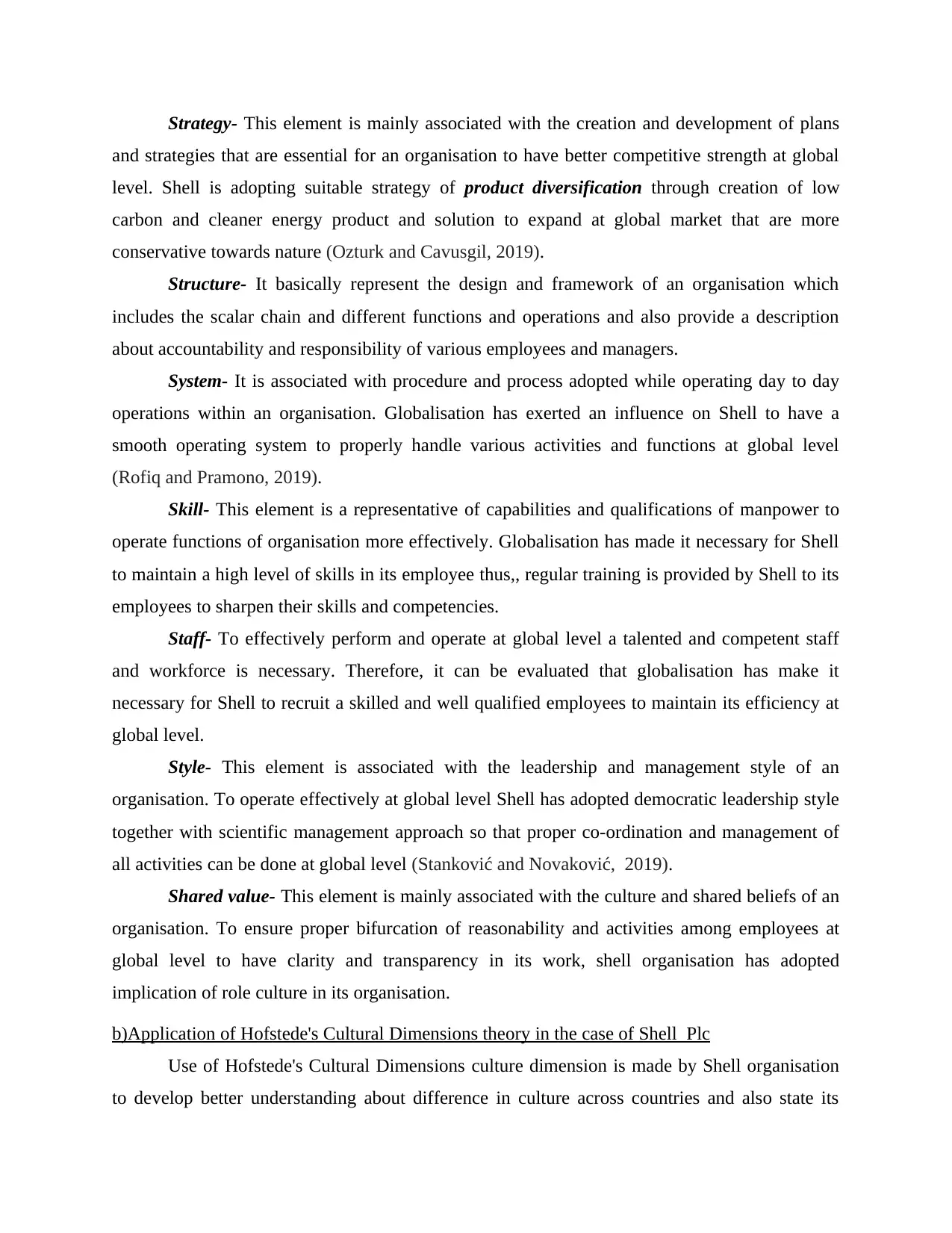
Strategy- This element is mainly associated with the creation and development of plans
and strategies that are essential for an organisation to have better competitive strength at global
level. Shell is adopting suitable strategy of product diversification through creation of low
carbon and cleaner energy product and solution to expand at global market that are more
conservative towards nature (Ozturk and Cavusgil, 2019).
Structure- It basically represent the design and framework of an organisation which
includes the scalar chain and different functions and operations and also provide a description
about accountability and responsibility of various employees and managers.
System- It is associated with procedure and process adopted while operating day to day
operations within an organisation. Globalisation has exerted an influence on Shell to have a
smooth operating system to properly handle various activities and functions at global level
(Rofiq and Pramono, 2019).
Skill- This element is a representative of capabilities and qualifications of manpower to
operate functions of organisation more effectively. Globalisation has made it necessary for Shell
to maintain a high level of skills in its employee thus,, regular training is provided by Shell to its
employees to sharpen their skills and competencies.
Staff- To effectively perform and operate at global level a talented and competent staff
and workforce is necessary. Therefore, it can be evaluated that globalisation has make it
necessary for Shell to recruit a skilled and well qualified employees to maintain its efficiency at
global level.
Style- This element is associated with the leadership and management style of an
organisation. To operate effectively at global level Shell has adopted democratic leadership style
together with scientific management approach so that proper co-ordination and management of
all activities can be done at global level (Stanković and Novaković, 2019).
Shared value- This element is mainly associated with the culture and shared beliefs of an
organisation. To ensure proper bifurcation of reasonability and activities among employees at
global level to have clarity and transparency in its work, shell organisation has adopted
implication of role culture in its organisation.
b)Application of Hofstede's Cultural Dimensions theory in the case of Shell Plc
Use of Hofstede's Cultural Dimensions culture dimension is made by Shell organisation
to develop better understanding about difference in culture across countries and also state its
and strategies that are essential for an organisation to have better competitive strength at global
level. Shell is adopting suitable strategy of product diversification through creation of low
carbon and cleaner energy product and solution to expand at global market that are more
conservative towards nature (Ozturk and Cavusgil, 2019).
Structure- It basically represent the design and framework of an organisation which
includes the scalar chain and different functions and operations and also provide a description
about accountability and responsibility of various employees and managers.
System- It is associated with procedure and process adopted while operating day to day
operations within an organisation. Globalisation has exerted an influence on Shell to have a
smooth operating system to properly handle various activities and functions at global level
(Rofiq and Pramono, 2019).
Skill- This element is a representative of capabilities and qualifications of manpower to
operate functions of organisation more effectively. Globalisation has made it necessary for Shell
to maintain a high level of skills in its employee thus,, regular training is provided by Shell to its
employees to sharpen their skills and competencies.
Staff- To effectively perform and operate at global level a talented and competent staff
and workforce is necessary. Therefore, it can be evaluated that globalisation has make it
necessary for Shell to recruit a skilled and well qualified employees to maintain its efficiency at
global level.
Style- This element is associated with the leadership and management style of an
organisation. To operate effectively at global level Shell has adopted democratic leadership style
together with scientific management approach so that proper co-ordination and management of
all activities can be done at global level (Stanković and Novaković, 2019).
Shared value- This element is mainly associated with the culture and shared beliefs of an
organisation. To ensure proper bifurcation of reasonability and activities among employees at
global level to have clarity and transparency in its work, shell organisation has adopted
implication of role culture in its organisation.
b)Application of Hofstede's Cultural Dimensions theory in the case of Shell Plc
Use of Hofstede's Cultural Dimensions culture dimension is made by Shell organisation
to develop better understanding about difference in culture across countries and also state its
⊘ This is a preview!⊘
Do you want full access?
Subscribe today to unlock all pages.

Trusted by 1+ million students worldwide
1 out of 21
Related Documents
Your All-in-One AI-Powered Toolkit for Academic Success.
+13062052269
info@desklib.com
Available 24*7 on WhatsApp / Email
![[object Object]](/_next/static/media/star-bottom.7253800d.svg)
Unlock your academic potential
Copyright © 2020–2026 A2Z Services. All Rights Reserved. Developed and managed by ZUCOL.





